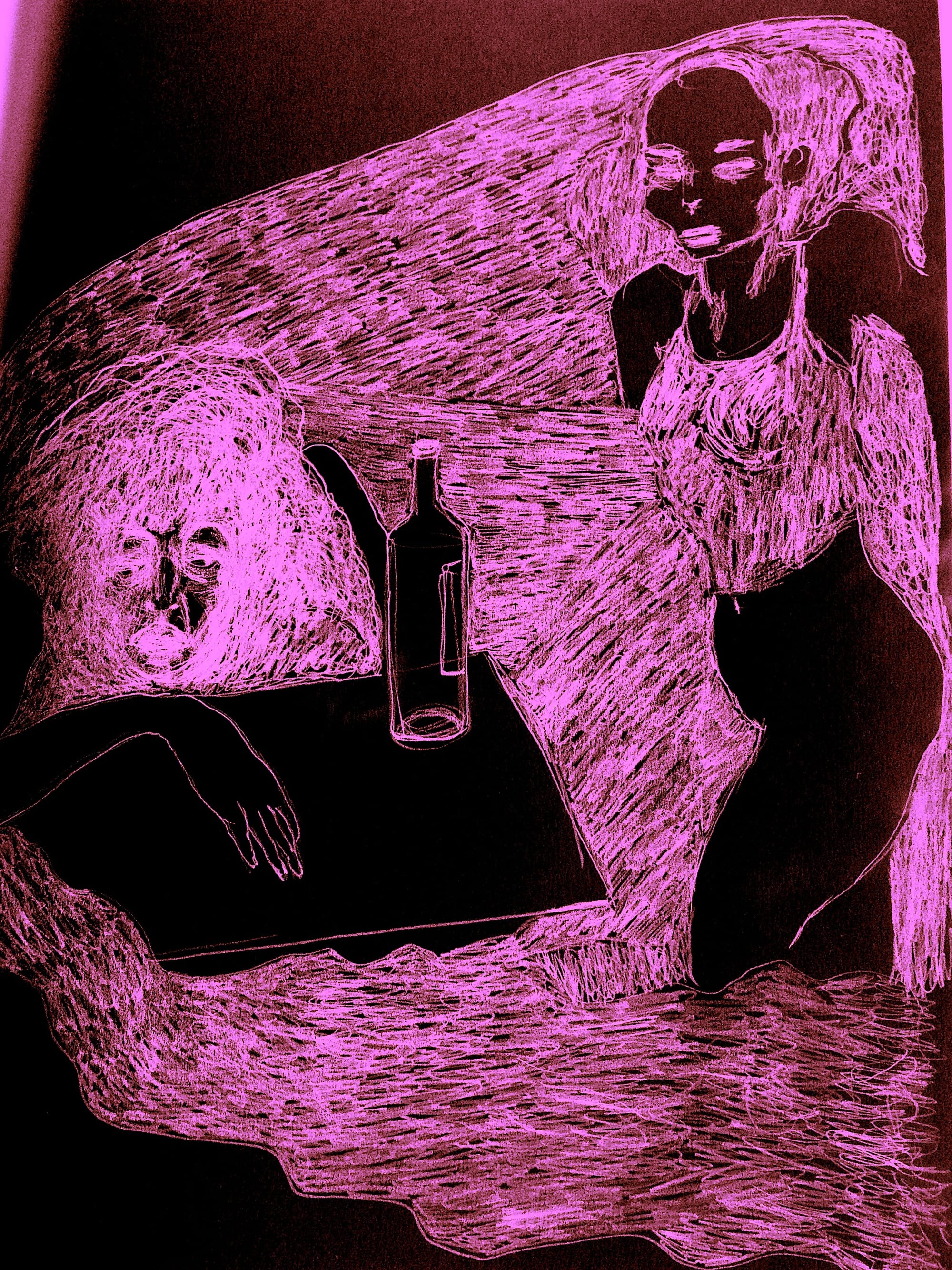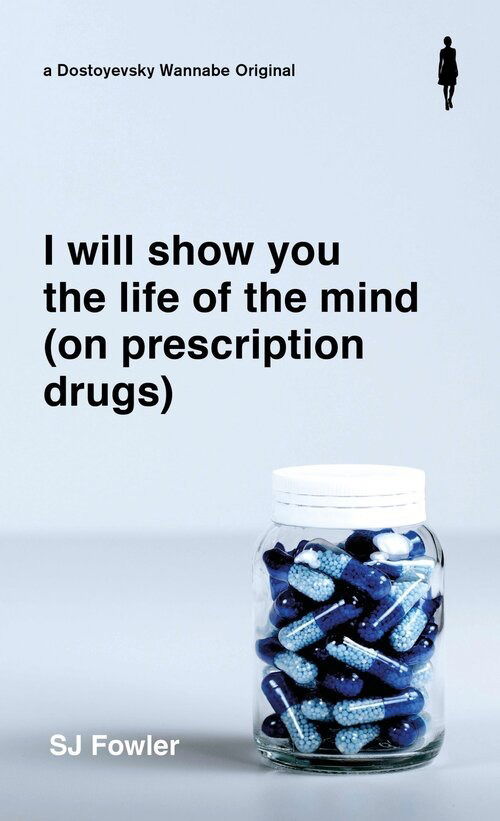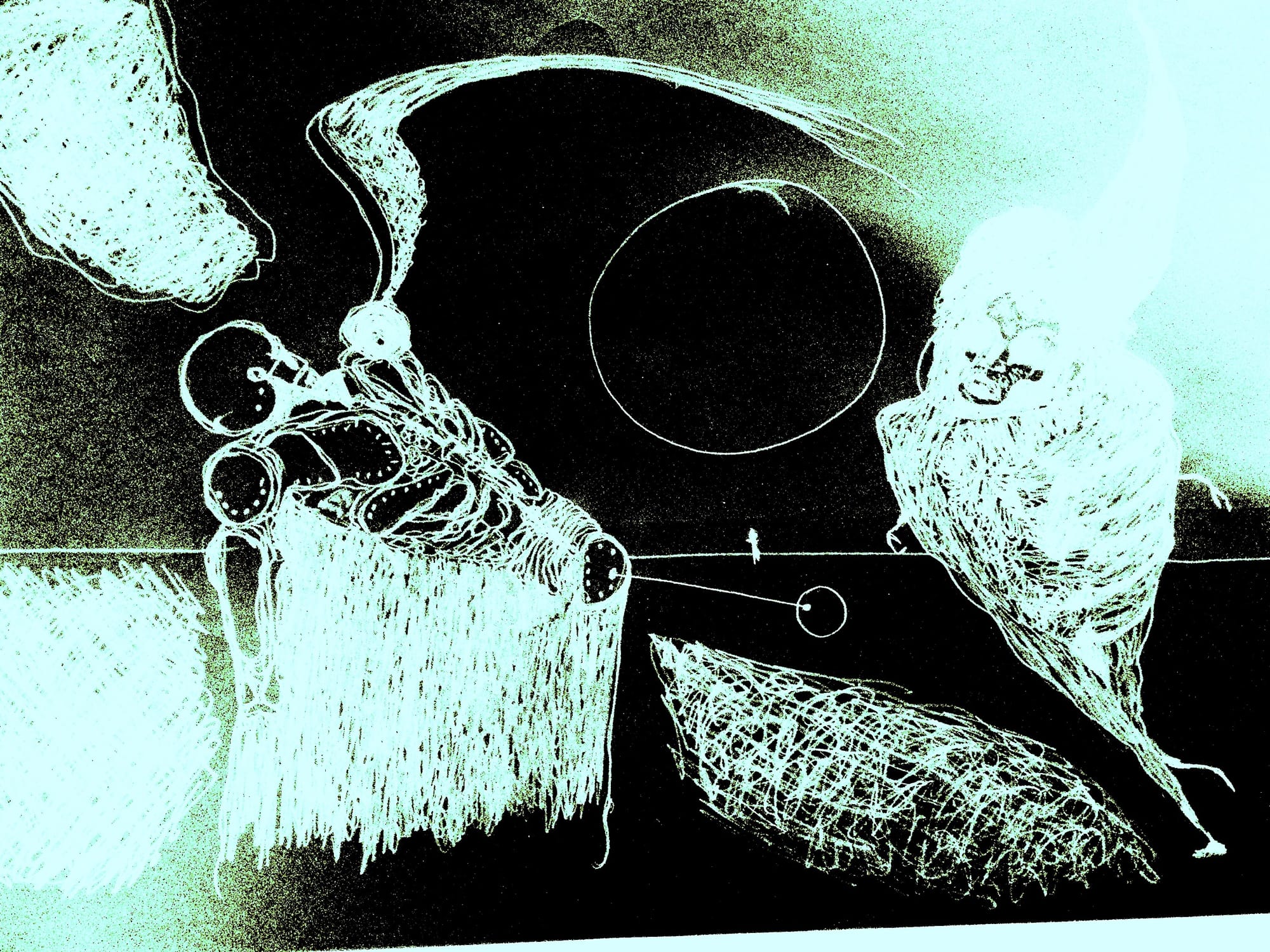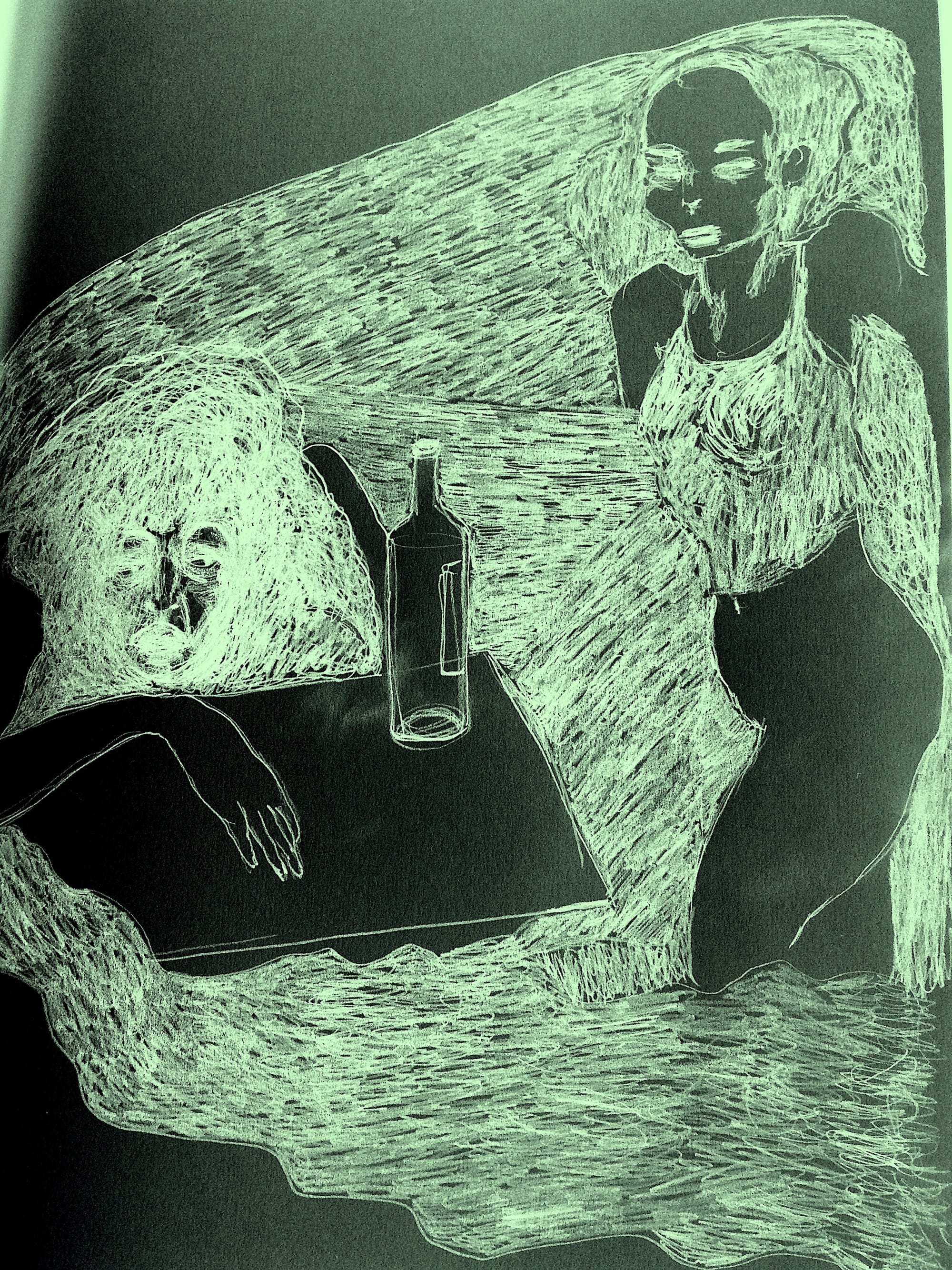Brief Asides on SJ Fowler's I Will Show You the Life of the Mind (on prescription drugs)

By Richard Marshall

Steven S. J. Fowler: I Will Show You the Life of the Mind (on prescription drugs) Dostoevsky Wannabe 2020
The blurb summarises.
“From the mysterious recesses of the mind (or is that brain?) comes the urge to fix our sadness! Drugs are the answer, allied with literature. Legal, prescribed drugs, by hurried doctors, which reroute synapses in millions of human beings consciousnesses. What is the poetry of this ubiquitous but hidden malforming of the already overblown 21st human mental experience? In England, of all places? Who knows?! But SJ Fowler’s inventive espousing of fiction, poetry, illustration and found-text, as one singular literary undertaking, offers up the mess and hope of searching. A choose-your-own-adventure novel into the pits of your cognisance, this truly original book of confusion and consolation, as generously vulnerable as it is challenging, is by turns sad, funny, abstract and painfully clear. What emerges is YOU: the writer, the reader, the patient, the doctor, the doubt and decision, and how to newly express this, a life of the mind…on prescription drugs.”
The life of the mind spreads itself over its objects, to misquote Hume, and our mistake is to assume its activities are features of reality. All well and good, but Fowler has written one of those infernal artifacts of desire that shows there are exceptions to any useful rule of thumb.
‘Quite the revelation. To understand, finally, why most of the earth believes. What you understand before as a need, the sickyness unto death, that might be contemptible, is now your own small vase of flowers. You don’t feel ashamed , because when you understand , your previous foolishness is swept away. So many metaphors in that book for illuminaton and for cleaning. The pill as prophet, the proluctor. You, once again, no longer believe what you once fervently believed.’
So far, so Kierkegaardian. The private garden of a dying mind, loaded and loading prescription drugs towards a dying end in ‘a state of extremely slow emergency’, is laid out as compassion and seed initiates. Substituting feeling and emotion with slo-mo information mosaics the life resembles one rapidly discarded stage set after another, folding over and over, with permanent effect, a sense of meaning ruled by shifting identities, transient delusions and fickle estrangements. We're given forms of definiteness, pure potentials for the specific determination of fact, process loads, answering Locke's ideas by their general fact of systematic relatedness underlying both eternal objects already realised in time and those still undetermined potentials awaiting realisation.
‘Look at me now, you think. Behind a façade of comforts and pleasantries, behind my shopping window full of luxuries, behind the veil of tastes, there is nothing but a yawn of eternal boredom. I am a bit of a dead place, four walls protecting me from fat skeletons. You don’t quit your job as much as stop going.’
But as Fowler makes clear, that stopping is slanted against a green screen in a mythical, electrical land.
If you want the hallmarks of twenty-first century conclusions then Fowler has the pharmacologicalised verse and chap book. It’s an immense continent of traumatic inner isolation, a sealed world where future and past hardly penetrate. The present eats its own voices. Then devours all the rest. It’s subject matter is the rationalization of guilt and estrangement, and the elegant pleasures of calculating the parameters of one’s correspondances. The excitements of pain and death and all the veronicas of perversion inscribed through medicalised language are transcribed. This is so to the moment. The technologies of this medicalised science multiply around us. All the world currently holds its breath for vaccine salvation. Increasingly the languages we speak are dictated by this. Fowler recognizes that our damned world requires us to either use this language or remain mute.
‘Choosing our own adventure sounds nice but it does create a few problems. It presumes free will exists and you know this is knotty, even if no one you know ever talks about it… And what difference does choosing make when the end is the same.’ The book’s a choose your own adventure book, so readers get to mix up orders, timelines and reasons but as the man says, you end up where you end up anyways, where, as he puts it, ‘It just kind of trails off.’
It’s a language that literally will close the door behind us as we go. ‘Chlordiazepoxide otherwise known as The Crutch Fathers otherwise known as St Augustine of Hippo…’ what does it do? It ‘… closes the door behind him.’ This is one tough sonnoffabitch where there will be ‘no one to lull my distress.’
We think prospectively even in the cannibal present. Here is the great annexation that Fowler has transcribed so brilliantly. Options multiply for the future but there is increasingly no future. The instantaneous present now palls, and draws itself out along lifestyle, travel, sex, identity trajectories that are both easily satisfied and utterly drained and unsatisfying. The inner world of the mind and the outer world of reality fuse. Lives become discarding stage sets. Ours is an infantile world of neural intervals where faces are diagrams and reality forms the geometry of psychopathology. Fowler rubs us up against a psyche that quantifies itself in terms of absence. This is the fetal world sans placenta or umbilical cord. Other people, conversations, sites of chance meetings or planned, they become vivid hallucinatory balconies of damaged reductive fables. As Fowler pits it:
‘ My 600 pound life is on a break./ Keep up with your world, says the voiceover.’
The whole story – and there is a story here, a kind of extended crash landing signal with obessions and no kinaesthetic language beyond those provided by the instructions on the manuals and internet downloads, subtle declentions and improv semiology derailing facades of travel. Viceovers. We’re left with a panorama of disease carapace. The world is a kind of meaningless animal somehow attached to us via over-calculated need and lurid complexity. Yet it is also discreet, like a dressing table mirror or diagonal parking space.
Fowler takes a blur of our multiple selves and overlays them with geometric diagrams like secondary anatomies taken from dense literary reflex autopsy reporting. It reads like space sickness, a reality of time not space actually, a kind of insanity that's part of a contingency plan probably laid down in our genetic base millions of years ago, a chance to escape into a world beyond time. Readers are like pilots touching the ailerons and fuselage of a strange but familiar aircraft. The choice of detail is a limitless paperweight. Like someone leaving something strangled at birth on your writing desk.
Ritalin emulates binge watching the Marvel Netflix series The Punisher. He's a central avatar, existing here in total time showing us cartoon evidence for Epictetus the Stoic's aside on Zeus: ' Gods submit to the laws of necessity.' Punisher as forsaken mannerism. To be forsaken at such an extreme point, and yet still be love. Kierkegaard pits Job against Hegel, dreaming a language outside modernity's silence. Fowler's poetic form points through muteness to how all this living thing works when you’re exiting. All the psychotics are here where bored Romantic aestheticism is a trial subscription and toilets ‘… ditches, filled with teeth/that have come from heads…’ where, ‘against the pretence it all doesn’t come down to an individual’s judgement anyway’ you decide it probably does. The show’s a clozapine antidote, where Jon Bernthal’s ‘… the best version of ourselves that can be played.’ What’s the equation: it’s straightforward:
‘ Foreigners in one queue,/criminals in another. Hypocrites, bastards, the dread/count. Maths on one hand./Weasels chewing bones, leaving/tiny skulls behind on shirts.’
It’s a calming fantasy world which really asks, deep down, ‘If happiness appeals to you, under what conditions have you/come to this conclusion.’

From a certain angle the book’s a time machine trying to bring us all back to life powered by its disinherited secondary anatomy. If there’s a core here it’s about the imagination and how it can’t be repressed. It survives the sex drive. It survives hunger. If the whole social base for life is provided by corporate medical technology and science, its language working like traffic systems guaranteeing safe passage in this world, then this is anti-social consolation writing for its parallel. And that’s where the excitement starts. Even though it’s not exciting. It’s extremely difficult to commit a serious crime or genuinely perverted act. The world is too powerful. We're hanging on a double inheritance. Fowler has recognized this as a problem to which the slow unfolding of our slow emergency reorganizes and proposes as a solution.
The anxiety of psychopathology becomes the predominant anxiety. Imagination in the intense privacy of one’s own unconscience may plant the bomb that returns us to some sort of meaning. The deliberate immersion of oneself in all sorts of destructive impulses – not sadism and meaningless cruelty, the stock in trade of the American entertainment industry and the vanilla S & M Grey Shades routines for the suburbs – but ‘the deliberate immersion of one’s imagination in all sorts of destructive impulses’ as Ballard puts it somewhere (I’m sure). A kind of lifting the veil. Morally free psychopathology as a metaphor. The dismantling of conventionalized reality. The willing destabilization of thought. Trauma as liberation. Finding magic at the other side. Fowler’s projected voices join the magical objects of the Junkyard. Extreme solitariness, extreme mystery, the possibility of suffering inexpressibly, resulting in the poetry of violent dislocation. Tolstoy's 'The Death of Ivan Ilych: ' Caius is a man, all men are mortal, therefore Caius is mortal, had always seemed to him correct as applied to Caius, but certainly not as applied to himself.'
There’s an obvious connection between Fowler’s book and Ballard’s injunctions. In one interview Ballard says, ‘ One cannot help one’s imagination being touched by these people who, if at enormous price, have nonetheless broken through the skin of reality and convention around us… and who have in a sense achieved – become – mythological beings in a way that is only attainable through these brutal and violent acts. One can transcend the self, sadly, in ways which are in themselves rather to be avoided – say, extreme illnesses, car crashes, extreme states of being.' He adds, as if afraid of his own words, ' I’m not suggesting we should all infect ourselves with rabies merely in order to enjoy.’ But the thought did occur, obviously, and lingers nevertheless.
Fowler updates some of this, realizing that there are many sides to everything and that in many many ways we love people but have never met one. And he has advice too, like the timeless, ‘ Sometimes a duvet is helpful.’ And before that: ‘ Essentially don’t run with negativity.’ Throughout the prescriptions renew themselves so that everything happens in the affirmative so even lost time is, as he admits, at least happening in time. All is not lost. Fowler is a grafter. Don’t be fooled by any of this. ‘Such simplicity can only be achieved with enormous effort.’
Fowler interrogates a total transformation of our nervous system through terminal disease phenomenology resulting in a slowed-down popped-up blown obsessive. The deviant imagination is given a new spin as Fowler cuts through the cockpit of received views to show how slow burning terminal disease may at least deliver this one silver lining: an ultimate surreal act we can’t escape. Of course being alive itself is terrifying and with a little imagination the nervous system doesn’t need the stimulus of drugs or death if you persist long enough.
Nevertheless. The book’s the ulterior to hard-core porn, say, where the arty, abstract medicalisation of the sex act ultimately bores and overloads like sit-com geakdom. Fowler’s text is like disaster footage accumulating 200 hours of back and forth riveting obsession where a new myth emerges. It is absolutely not experimental writing but more like inevitable. Like dissecting room footage that then goes decidedly further and creates something else. Dissecting room footage creates indifference, inescapably, so Fowler takes what could be a tiresome exercise in the juxtaposed bizarre and digests and analogises it. Instead of brutalizing the reader there’s a jolt. He goes beyond the mere sensation and newness and turns our voracious inattention on itself. It’s like he’s pressing us to first notice the brand names that surround and make our worlds and then insinuate that they might not be all that important after all. In the sense that there may be an elsewhere. An elsehow. It’s why I watch seventies tv shows like Kojak, Columbo, Murder She Wrote and The Sweeney whenever I can. And films like Six Headed Shark. Endless repeats often with the sound down so I can glean the additional secrets. They’re ways of conjuring up myths that predate our modern immaculate worlds where, as Ballard again said, ‘even a drifting leaf looks as if it has too much freedom.’
The terminal disease opera of Fowler’s piece is an antidote. It’s been noticeable during the pandemic how the complete sanity of the modern world with its fetishised health and kindergarten tropes, it’s suburban middle management aura that bombards us with advice each day and night to stay indoors and watch quality tv , avoid eye contact, pump iron, run marathons, disinfect glans and study vast data sets of disease graphics seems merely an exaggerated normal rather than offering the relief of a sinister new. We hear instructional questions which refuse to use ironic fonts or reference Dante, such as ‘Can you separate the muscles for study…? ‘ and the evergreen psycho question that haunts us all:
‘ We’ll never know, but the way these patterns are looking in general population, had I been abused, we might not be sitting here today…’
Fowler hovers on the edge of seriously marginal literary material, and is reacting responsibly to matters of enormous public concern, going full-on without reassurances and defining a strong sense of propheteering. Published before the pandemic, what Fowler is reporting is the mystery of our flesh-mind strangeness, our poetic longings and beauties. Not being telepathic, not being able to float, having hands, waking up from sleep, dense phobic dreams – these are weird things that he alerts us to like we’re encountering treasures from Faust’s witches night. It’s the Dantean thought that a widespread taste for pharmaceuticals is nature’s way of telling us we’re heading for extinction. Dying on drugs, dying as neuro-disease pathologies slowly burning you away, dying through a book of grey luxury, dying as young lovers tear up as you sit in underwear, dying as looking at bacon, dying as kissing the screen of your own phone, dying as a white hole with dark edges, dying as taking your new books to work, dying as upstairs, dying as the differntial between the potential of matter, and its actual content, dying as an opportunity for unprecedented courage, all this shows how a vast technological druggy metaphor can meet profound psychological and artistic needs. It represents a complex mesh of personal fulfillment of every conceivable kind. The tropes alienate for one last time the dramatic role of the sex, drugs, meditation and mysticism of inner space. Drugs become gleaming monstrous machines, taking you across a new landscape like an express train or fast car, an extension of our own personality on all sorts of levels, an outlet for Mona Lisa’s repressed sexuality, violence and love. And all sorts of positive freedoms , like the freedom to kill yourself, to involve oneself in the most dramatic event of one’s life barring birth, all those conscious and unconscious pressures bearing some dead doctor’s name. Dr Nowazadran, the shrugger, with naked Pauline and AC/DC live in Buenos Aires.
‘Keep up with your world, says the voiceover,’ just after Keitel in Bad Lieutenant has direct lined, which, in a way, links with the bad warp of Kojak I attend to on weekday daytime tv which, ‘creating necrose amputations upon the skin of the bitten… cures overpopulation.’ There’s a moment when no behaviour is conscious, and another time when ‘awareness is evidence.’
No spoilers but.... What’s the message? Well here’s one, that Jim Fallon character, who finds he’s got the brain scan of a psychopath, he really ought to be worried.
